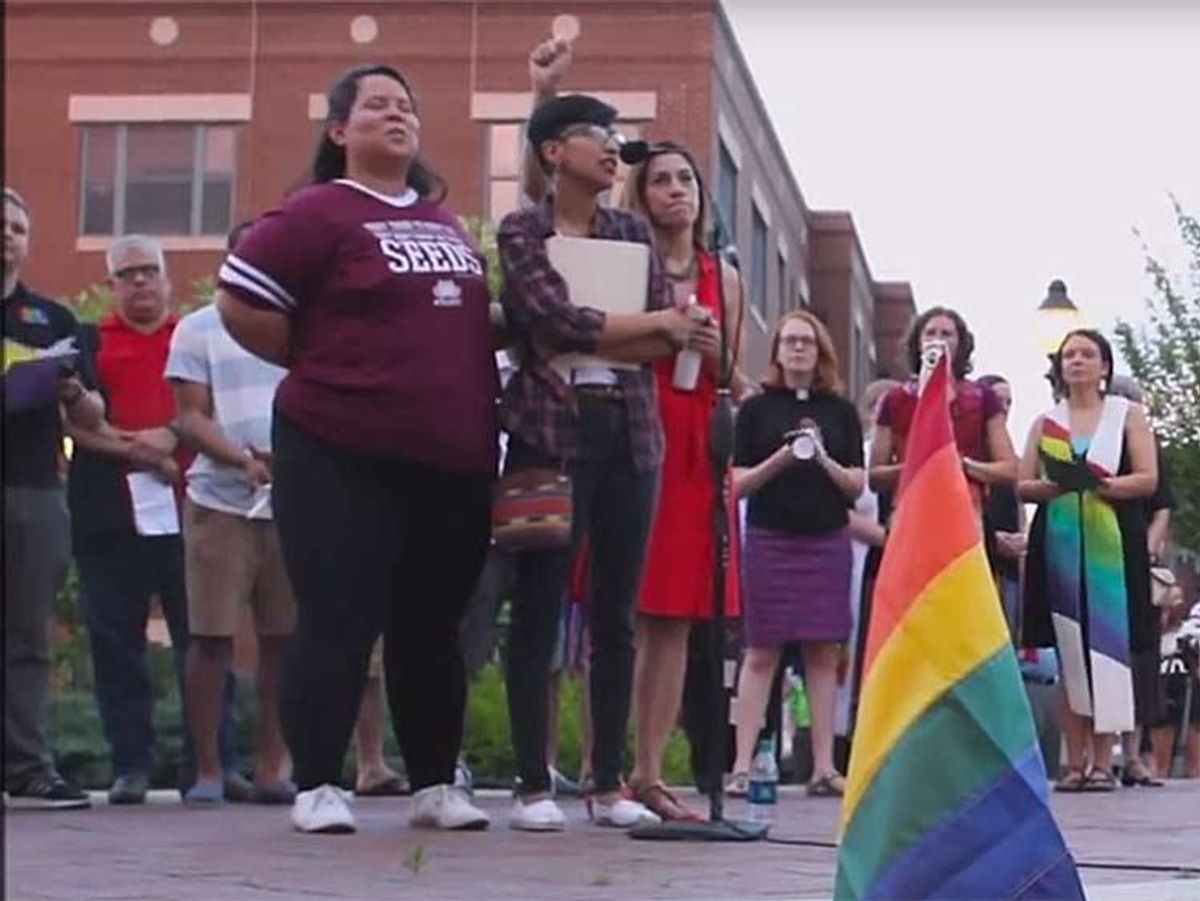Tiffany Melecio wanted to go to the vigil at the University of Missouri at Columbia because she thought it would be a safe space for her to honor the victims of the Pulse shooting.
And she wanted to read the names. She thought some people might have trouble pronouncing the Spanish names properly, so she volunteered because "they deserve to be spoken correctly."
Melecio also wanted to raise the voice of LGBT Latino people who, because of feeling the attack on both of their communities, are experiencing the grief differently.
The graduating Mizzou senior was scared as she took the stage and saw the crowd. It was larger than she thought it would be and unlike what she expected, predominantly white and from the town of Columbia, instead of the university population she felt comfortable in. Melecio says she lives just seven minutes away from Ferguson, Mo., where black man Michael Brown was killed by police, and was on campus and a part of racial injustice protests at Mizzou in 2015. Those experiences have left her more aware of the dynamics of race in society and her vulnerability as a queer woman of color.
"I am afraid of white people, that is a fact," Melecio tells The Advocate via phone. "Because, as a student on campus, I've been yelled, 'Welcome to America' countless times by white men." Melecio's background is Puerto Rican and Guatemalan.
"But I felt that it was necessary to put my fear aside for a moment to honor the people that were lost," Melecio says, "because at the end of the day they may have been LGBTQ, but they were also brown and that needed to be said."
What she feared is exactly what happened. Melecio started the speech reacting to the fact that the crowd was predominantly white, and then continued to discuss facts about the LGBT movement and the involvement of people of color. She also noted that she wished there were just as many people from this rallies focused on racial justice. All done in a calm, somewhat timidly powerful manner -- and all generally received well by the crowd. Except for a couple of guys and some hateful people on social media.
College Fix, a conservative website, published the video of Melecio's speech and the reactions of two men, identified as Carl Brizendine and his husband, Daniel, in a report titled "Mizzou Race Activist Hijacks Orlando Vigil as Gay Community Rebukes her." But did she hijack an event where she was encouraged to speak at about issues? Or were a couple of men just closed-minded about the thorny issue of race?
In the video, Melecio says to the crowd, "As much as it is awesome that there's so many people here today, but it's, like, who are you really here for?"
An unknown woman responds, "We're here for everybody!"
Then Brizendine is heard yelling at Melecio, "We are here to be uniting, not dividing, which is what you are doing now." The crowd responds with dissatisfaction, and then cheers a Mizzou staff member who begins to address Brizendine from the stage.
"So if you are not comfortable with the fact the people who are murdered are Latino people, that is a personal problem," says the staff member, identified by College Fix as Stephanie Hernandez Rivera. "You can't be an ally to one person or part of a person."
Melecio says she prepared a speech beforehand, but wrote it with a different community in mind. Her community. The social justice community she grew in over the past five years at Mizzou. But with the encouragement of university staff members, she spoke from the heart.
Brizendine seemed to think that Melecio was trying to be divisive by bringing up race and stormed out of the vigil followed by a cameraman who captured his comments -- Fox News, unsurprisingly, jumped on the story.
"We're all hurt," Brizendine says. "But I'm tired of our community, and I'm not talking about just the LGBTQ community here, but also our community in Columbia, our community in Mizzou ... everything has to be divided into color."
Brizendine's husband agreed.
"I expected a community to come to gather ... everyone," Daniel Brizendine says to the cameraman. "I got someone speaking onstage that tried to make it all about her culture, and that's a common thing now."
Her culture was directly affected, it was about people exactly like her -- that's why she spoke in the first place. Melecio says she "shut down" after the Brizendines heckled her, and that the experience has left her hurt. She says her intent was not to divide people over the issue of color, but to make sure that it was mentioned. Before she spoke, she says she was probably the only person to specifically mention that the victims were Latino, that they were specifically her culture.
"At the end of the day I'm a brown woman that went up there and said it ... and I got booed, and I got called a lot of mean names," Melecio says. "And people agreed ... or they didn't understand what I was trying to say."
She's doesn't regret that she did it, and there were many more people who were receptive to the message than not. The journalism graduate-to-be is hopeful that people see what her message actually was, instead of how it's been portrayed by some. And she thinks that more understanding of intersectionality -- the term coined by Kimberle Williams Crenshaw referring to the relation of overlapping social identities -- will be key to building more understanding among LGBT groups.
"We need to listen to one another and we need to listen to the facts ...and the fact is those were LGBTQ people and those were also brown people," she says. "We can't move forward unless those conversations happen."


















































































Fans thirsting over Chris Colfer's sexy new muscles for Coachella